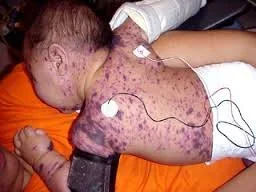Meningococcal Disease
Meningococcal Disease, often shortened to 'Meningococcal', is a life-threatening bacterial infection that can cause death within hours if not recognised and treated on time.
It is caused by the bacterium Neisseria meningitides and can cause septicaemia (blood poisoning) and meningitis (inflammation of the brain lining).
Although it is not very common it is very serious. It’s a particular worry to parents of infants and teenagers because it primarily targets children under five and teenagers 15 or more.
It is easily confused with the 'flu in its early stages before rapid progression requiring intensive care.
Symptoms in young children include fever, refusal to feed, irritability, grunting or moaning, extreme tiredness or floppiness, nausea or vomiting, diarrhoea, turning away from light, convulsions and rash of red or purple pinprick spots or larger bruises.
While many children will have a full recovery 10 percent of those affected will die and 20 percent of survivors will suffer devastating life long disability such as brain damage, sight and hearing impairment, severe scarring and/or amputation of limbs.
Meningococcal B is the most common cause of bacterial meningitis in Australia*. Today meningococcal meningitis and septicemia are the leading infectious cause of death in children under five in Australia.
The only truly effective way to prevent meningococcal disease is vaccination.
At the moment this vaccine is available but not yet subsidized under the National Immunization Program Schedule. That means for the time being families have to pay if they want to protect their child against Meningococcal disease.
Like other vaccines the Meningococcal B vaccine works by strengthening your child’s immune system to recognize and fight off the bacteria.
The vaccine has been tested on thousands of people including more than 5000 babies and toddlers with results showing side effects are generally mild and temporary (for example fever and pain at injection site).
Since the vaccine was licensed over a million doses have been given with no safety concerns identified.
Leading Steps Paediatricians highly recommend the Meningococcal B vaccine.
To obtain the vaccine and for more information talk to your GP
* Hib was the commonest cause of bacterial meningitis in Australia until 22 years ago when a vaccine was introduced to protect children from it.
More information available from:
http://www.meningococcal.org.au/
http://www.immunise.health.gov.au/internet/immunise/publishing.nsf/Content/immunise-meningococcal


